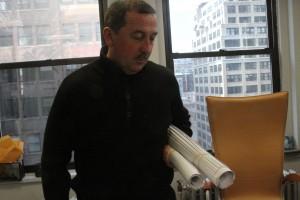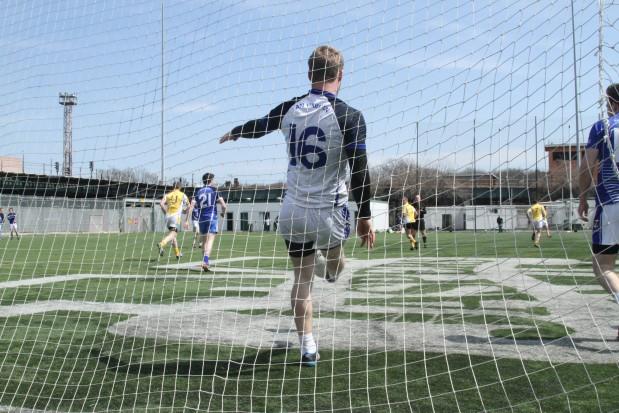How Irish immigrants in New York City see immigration reform
Gaelic football in the Bronx, New York. (Photo: Ines Novacic)
"Construction in New York has always been recognized as an Irish thing," Tim Devlin, an Irish-born general contractor who runs a construction business from midtown Manhattan, tells me. "We helped build this city, it goes back for decades and decades, it was certainly here when I first arrived in the 80s."
Uptown from Devlin's office, on the final stop off the 1 subway line, the wind whistles as Irish football players lunge into each other during a Sunday tournament at Gaelic Park in the Bronx. In the shadow of Manhattan College, the 2,000-seat stadium is the heart of the Irish community in New York City.
To most Irish and Irish Americans, these players are familiar faces in the community, but they do not hold a special place just because of their athleticism. Most of them are also here illegally, working low skilled jobs in construction, and getting by thanks to the Irish support network.
These men now stand to benefit from a comprehensive immigration reform bill unveiled this week by a bipartisan Senate group. It includes a pathway to citizenship for the estimated 11 million people living in the United States illegally — and also proposes "W" visas to thousands of low-skilled workers in trades like construction.
A loosely-organized interest group called the Irish Lobby For Immigration Reform estimates that 50,000 undocumented Irish live across America. In New York City, many of these undocumented men start out on building sites.
"The manager of the football team he got me. He was a contractor and I'm a carpenter and he got me and I was working with him for years," one player tells me after his game."
"I was actually brought out to play for a team. I was brought from Ireland to play. I was only planning on staying for the summer but I sort of fell in love with the place."
It's a familiar scenario in these circles: young people come from Ireland in search for work, they overstay their tourist visa, they're helped by someone from the Irish community.
"Most of us here are undocumented, I would say about 99 percent," another player tells me. He came to New York two years ago and works on construction sites all over the city. We'll call him Seamus. "That's how most people get jobs here. Somebody who know somebody who plays Gaelic football will always work for somebody."
The Irish have been coming to America since the early 19th century, usually in waves — if the economy in Ireland suffers, America is the first place they turn to in search for work. That's what happened in the 1980s, the last time large numbers of undocumented workers arrived.
Tim Devlin, the construction business owner, was one of them. He runs a construction business in midtown Manhattan.
"I came here in 1984 and started construction three days after I arrived here, worked my way up from working in the Bronx like most people did or Queens, all the way up to 363 7th avenue basically," he says.
In other words, from working as a laborer to building things like skyscrapers in Manhattan, Devlin has built a life for himself in this city. Today his office is non-stop.
"I don't even know how they do it anymore," says Devlin, referring to life as an undocumented worker. "When I came out it wasn't so hard, and all of us still here obviously became legal. It's gotta be really, really tough. Regulations with the banks, regulations with the government, and you have to have ID and you can't get a driver's license."
A construction site that I visit with Devlin — an old, gutted church in Queens — has no Irish laborers, rather men from Latin America. Drills and hammers on steel mute the sounds of Spanish. Devlin says that a temporary visa program for low-skilled workers, an initiative pushed by the recently unveiled Senate bill, would benefit all of his employees.

The Irish community has lived through, and lobbied for, several immigration bills since the 1980s. For a time, they won some success with increased visa types and quotas until 1996, the last time comprehensive immigration reform was signed into law.
Although the community is buzzing about the prospect of new immigration legislation, the majority of those undocumented aren't exactly holding their breath. "There's always hope but at the same time, until something concrete is written down there's no point in getting carried away," says Seamus.
Our coverage reaches millions each week, but only a small fraction of listeners contribute to sustain our program. We still need 224 more people to donate $100 or $10/monthly to unlock our $67,000 match. Will you help us get there today?
